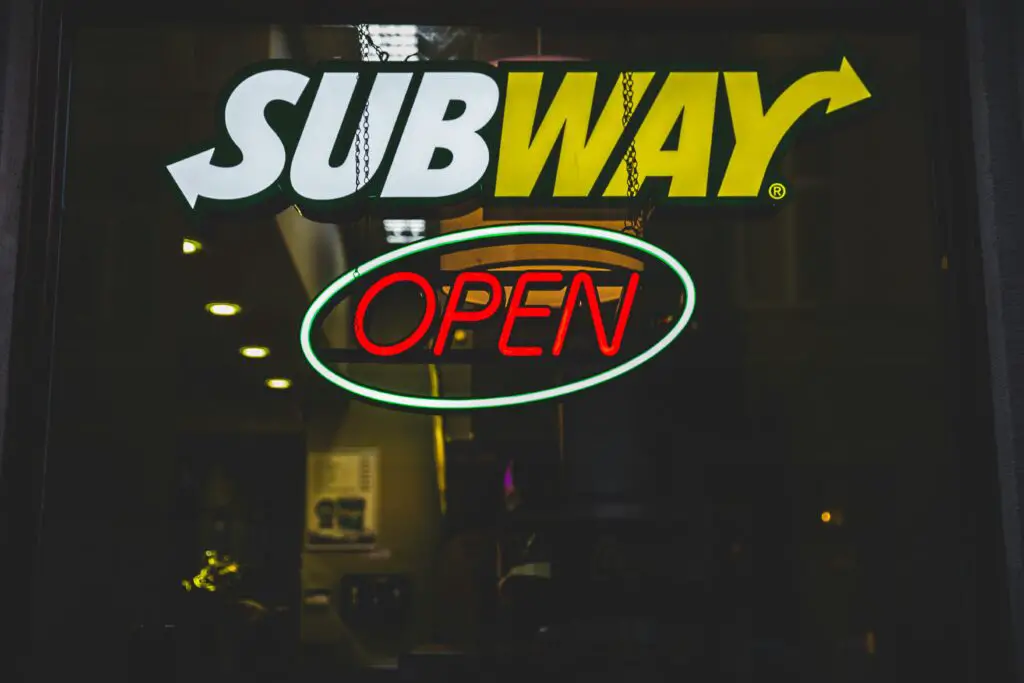Coupons are a shopper’s best friend. They allow us to get things we already want for excellent prices. Sometimes, coupons can persuade people to buy things they wouldn’t get. People particularly like coupons for restaurants; who doesn’t love a sweet treat from time to time? Despite these benefits, coupons can also be confusing, especially in the world of food franchises and small brands. So, are advertisements valid contracts? Do franchises have to follow their parent company’s promotions? Are there specific franchise laws and regulations? Let’s get into it.
Viral Subway Franchising Dispute
Subway is a franchise that has seen many disputes over its coupons and advertising campaigns. Take, for instance, this viral video clip that shows a customer arguing with Subway staff. The customer shows his coupon and complains to the workers about putting in a takeout order. According to him, the order should have had some special advertising sale price taken from it.
In response, both Subway workers exclaimed that their franchise was not participating. The argument went back and forth for a short while. Ultimately, it was assumed that the customer did not get their way.
Issues like this have been getting a lot of news coverage lately. In a recent release, Subway, as a parent company, stated that they will start obligating franchises to follow nationwide promotions. They organize legal contracts to support this goal and remain determined to deliver deals to customers across the nation.
In response to this clip, TikTok attorney Ugo Lord has made a detailed response. In his reaction, he explains that Subway is a franchise chain, meaning individual owners claim stores under a parent company. It is always up to the franchise owner whether they participate in their parent company’s nationwide promotion. Even if that weren’t the case, the Subway is a private store, meaning the owners and operators retain the full right to kick anyone out for any reason.
What Are Franchises? Franchise Law Explained

Franchises operate as businesses under a parent company. They are effective licenses that allow the owner to use intellectual property from the parent company. Franchisees can use information and tools such as the parent company’s:
- Branding and logos
- Products and merchandise
- Advertising and financial support
- Backed company name
A franchisor owns the original trademark and business model. They use a contract or license to allow a franchisee to open a location under their name with their intellectual property. Franchisors establish agreements that outline the specific properties available to franchisees. They can impose restrictions on product usage and uphold standards within the franchise. While following the contract agreements, franchisees can usually control some advertising, promotions, management, hiring, and other daily business processes. In return, they pay a franchisor a percentage of their revenue.
Franchises are Individual Businesses
As illustrated by attorney Ugo Lord, franchises are individual businesses in their own right. Under franchise law, they must follow some important rules. The Federal Trade Commission has an extensive document outlining the requirements and regulations franchises must comply with. Regulators strictly enforce these franchise laws to safeguard consumers from unethical business practices.
Most franchise contracts can be lenient regarding what the individual franchise has control over. As described, advertising, hiring, and daily processes generally fall under the control of franchise owners.
Many nationwide promotions even cite this in their terms and conditions. Most promotions make remarks such as “applies to only certain locations” or “up to franchise discretion.” These reminders ensure that consumers recognize that certain deals apply exclusively to specific locations, even if the franchises are widespread nationwide.
Are Advertisements Valid Contracts?

While franchises operate independently, you might wonder whether advertisements constitute valid contracts. When we encounter flashy ads and promotional deals, they seem like promises awaiting us at the store. However, the rules governing advertisements are frequently more intricate than they appear.
Contracts are unique legal ideas that describe when two parties agree on certain terms and conditions. The rules regarding what a contract is are extremely vague. They can range from something as fluid as an oral agreement to something as solid as a 100-page manuscript. In either case, you must have certain conditions met to have something be considered a contract.
In most cases, advertisements do not qualify as valid contracts. Instead, they serve as invitations for negotiation. For example, an advertisement promoting “delicious burgers” or “the world’s best milkshake” lacks clear terms and conditions that can be agreed upon. Consequently, if someone is dissatisfied with the burgers or milkshakes, they cannot argue that a contract has been breached.
Certain advertisements resemble contracts more closely. For instance, if a company advertises a specific product to be sold at a particular price, someone could reasonably argue that it constitutes an offer. This frustration often arises in franchise disputes like the one in the viral video. To mitigate this, many companies include fine print in their advertisements. In the case of franchises, the disclaimer “only at specific locations” absolves them of liability, preventing their advertisements from being universally considered contracts.
Conclusion
Customers often encounter frustration when their coupons become invalid at the register. Franchise deals are notorious for causing confusion and disputes. This typically occurs because franchises operate independently, and specific locations have the discretion to use or disregard promotional material.
So, the next time you’re craving a tasty promotional deal, it may be best to see if your location is participating in the fun!

